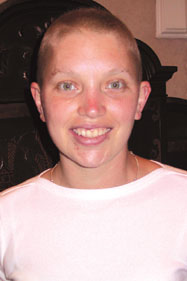
Director receives support against cancer
When students meandering from classes to residence halls see a young woman, sporting what they presume to be a new avant-garde summer haircut, they never stop to ask Virginia-Snider Hall Director Cristina Manieri why she is bald.
The answer is that 25-year old Manieri has lost her hair because she has gone through rounds of chemotherapy to treat breast cancer.
Shortly after Thanksgiving, she noticed a lump in her left breast and sensed something was wrong. On a visit to her doctor, she was told it was nothing, but they wanted an ultrasound revealed that it to make sure. The ultrasound did not look like a cancerous tumor, and she was told it was an infection and given antibiotics. She was still hesitant about the diagnosis and made an appointment with a surgeon. On Dec. 13, 2001, she went to the surgeon and was told they wanted to perform a biopsy. Thirty minutes later, she knew she had breast cancer.
According to the American Cancer Society’s 2002 surveillance research, breast cancer occurs in one out of every 229 females under the age of 40 in the United States. The society also estimated in 2001 that 12,300 new cases of breast cancer will be diagnosed among women in Texas.
Breast cancer survivor and SMU senior lecturer Kathy LaTour learned about Manieri’s plight. LaTour talked to her about having breast cancer and answered questions Manieri had.
“Cristina saved her own life. It’s maddening when doctors ignore really young women because they think they are too young to get breast cancer,” LaTour said. “No, it’s not common, but it happens. Cristina was smart to trust her instincts.”
Manieri’s initial reaction to the news was just to listen as the doctor continued to talk about cancer and the treatment. She wondered how she could have cancer; she had none of the risk factors, was young and thought she was invincible. After an initial night of difficulties and telling friends and family, Manieri accepted her diagnosis.
She learned that because of the size of the tumor, she needed chemotherapy to reduce the size of the tumor before she could have surgery. She went through chemotherapy, which had the side effect of hair loss. Surgery was the next step on the road to remission for Manieri. Her surgery was successful, and she is now quickly recovering and bounding back to her energetic self.
Her cancer diagnosis has changed Manieri’s outlook on the world. Aside from realizing she’s not invincible, she listens to her body more and finds herself being more thankful than the average 20-something.
Since Manieri recently moved to Dallas to take the hall director position, her first worry was that she did not have the close friends she would need throughout her treatment. Her worries then went to her job, but her supervisors told her not to worry about it and to take care of herself because she was more important than anything.
“It’s made me realize the beauty that lies in people and the beauty that I have and that I’m able to share with others,” Manieri said.
Manieri attended a breast cancer support group, but was disappointed because the majority of the women were twice her age and had children older than she was. Fortunately, her friends have been supportive and she knows she can call them if she ever needs anything. For Manieri and many other young people, having to rely on others is the most difficult part of the diagnosis.
After surgery, Manieri will have another round of chemotherapy treatment, as well as radiation therapy. Fortunately for her there will be a new resource to use as she progresses through her treatment.








